|
|
|
Sort Order |
|
|
|
Items / Page
|
|
|
|
|
|
|
| Srl | Item |
| 1 |
ID:
119985
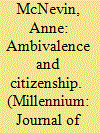

|
|
|
|
|
| Publication |
2013.
|
| Summary/Abstract |
Irregular migration gives rise to political claims that test the limits of political community and the expression of human rights in an increasingly interconnected world. This article provides a theorisation of the political claims of irregular migrants that starts with the notion of ambivalence. I argue that the ambivalence present in such claims can be understood as a political resource that is generative of new political relations across the terrain of human mobility and border control. In order to discern the generative quality of ambivalence, I argue in addition for an approach to theory production that is grounded in concrete migrant struggles. The argument is made via a critique of two theoretical perspectives that are influential amongst scholars working at the intersection of Migration Studies and Political and International Theory: the work of Giorgio Agamben and the 'Autonomy of Migration'. An approach that avoids the reductive accounts of power evident in both perspectives provides a better starting point from which to assess the transformative potential of irregular migrants' political claims.
|
|
|
|
|
|
|
|
|
|
|
|
|
|
|
|
| 2 |
ID:
087032
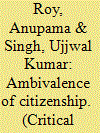

|
|
|
|
|
| Publication |
2009.
|
| Summary/Abstract |
The code of citizenship marks out the "other," continually reproducing and re-inscribing it through legal and judicial pronouncement in a relationship of contradictory cohabitation. The relationship is, however, not one of exclusion or simple opposition, but rather that of forclusion, where the outsider is present discursively and constitutively in delineations of citizenship. This article examines the manner in which the process of forclusion unfolded in the delineation of citizenship in Assam, in northeastern India, in particular in the contests around the Illegal Migrants Determination by Tribunal Act [IMDT] of 1983, and the complex reconfiguration of political forces and power relations between the Center and the state of Assam on the question of definition and identification of illegal migrants. The authors examine the contests over the IMDT Act, in the context of the elections in Assam in 1983, the Assam Accord of 1985, and the Supreme Court Judgment in August 2005 striking it down. They show how the illegality/alien-ness of the migrant became central to the construction of the Assamese identity in the 1980s and how the illegal migrant and the IMDT Act figured in precarious relationships of consensus and antagonism depending on the nature of political/electoral contests between the Center and state governments.
|
|
|
|
|
|
|
|
|
|
|
|
|
|
|
|
| 3 |
ID:
097454
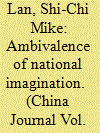

|
|
|
| 4 |
ID:
099766
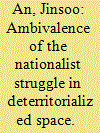

|
|
|
|
|
| Publication |
2010.
|
| Summary/Abstract |
This articale introduces a body of south Korean flims from the 1960's known collectiviety under the subgenre of Manchurian action flim and examines its ambivalant respresentation of anticolonial nationalism. Set in Manchuria during the colonial period (1910-1945), these films conventionally portray Korean nationalists armed struggle against the Japanese imperial force.This artical attempts to contextualize South Korea
Manchurian action flim first by relating the genre to Korea's modern historical dicourse of Manchuria and soucial memory of the Korean diapora experience
|
|
|
|
|
|
|
|
|
|
|
|
|
|
|
|
| 5 |
ID:
117619
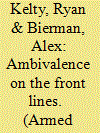

|
|
|
|
|
| Publication |
2013.
|
| Summary/Abstract |
In the past several decades, the US military has increasingly relied on civilian contractors to provide a variety of core functions. Lagging behind this increased reliance on contractors is an understanding of how the presence of contractors influences civilian and military personnel. This research addresses this question using a unique study of US Department of Army civilians and military personnel serving in Iraq and Afghanistan. We find a substantial degree of ambivalence among both groups regarding the impact of contractors on the military and comparisons with contractors, but we also find a noticeable trend of comparative discontent beneath this apparent ambivalence. Results are discussed in the context of using ambivalence as a starting point for building a theoretical approach to more systematically understanding the role and effects of contractor integration in the military.
|
|
|
|
|
|
|
|
|
|
|
|
|
|
|
|
| 6 |
ID:
091966
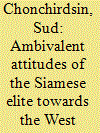

|
|
|
|
|
| Publication |
2009.
|
| Summary/Abstract |
Increasing and intensified political and cultural contact with the West during the colonial era constituted a serious concern for the Siamese elite. On the one hand, the kingdom needed to be modernized with Western-style knowledge and technology in order to survive. On the other hand, adopting Western civilization would lead to the loss of Siamese identity, which the elite wished to retain. They needed to select carefully which knowledge and culture from the West they considered to be 'civilized' and not harmful to their identity and political stability.
|
|
|
|
|
|
|
|
|
|
|
|
|
|
|
|
| 7 |
ID:
146111
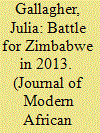

|
|
|
|
|
| Summary/Abstract |
On the face of it, the triumph of Robert Mugabe and ZANU(PF) in the 2013 elections came as a shock, not least to opposition MDC activists. However, after a period of introspection, many have begun to construct a coherent and wide-ranging account of the result which explores opposition shortcomings, and the revived relationship between the electorate and Mugabe's ZANU(PF). This article, based on interviews with political activists conducted three months after the election, outlines and attempts to explain this account. It explores the way in which a politics of polarisation that dominated Zimbabwe in recent years appears to have given way to a politics of ambivalence: where Zimbabweans once viewed their political landscape as one populated by antinomies, they now see their state and its relation to themselves in more complex and ambiguous ways. As a result, Zimbabweans' conception of the state is increasingly coming to resemble Mbembe's formulation of states as contemporaneously ‘organizers of public happiness’ and wielders of arbitrary violence.
|
|
|
|
|
|
|
|
|
|
|
|
|
|
|
|
| 8 |
ID:
156423
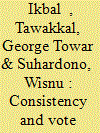

|
|
|
|
|
| Summary/Abstract |
This article examines ambivalence—the simultaneous holding of two or more conflicting values or beliefs about a political issue—among Indonesian citizens’ attitudes about vote buying. Using an original survey taken during the 2014 Indonesian elections, we analyse the factors related both to citizens’ normative views about vote buying and their willingness to accept gifts from candidates. A large number of citizens demonstrate ambivalence by viewing the practice as unjustified or corrupt and yet expressing willingness to accept money from candidates. We also examine the differential effects of education and income on these attitudes. Consistent with “demand side” theories of vote buying, low income creates economic pressure to accept money but does not influence normative attitudes about vote buying. Education, however, has a broader effect by influencing both normative attitudes and willingness to accept money. We consider implications of these results for Indonesian officials focused on reducing vote-buying behavior.
|
|
|
|
|
|
|
|
|
|
|
|
|
|
|
|
| 9 |
ID:
184239
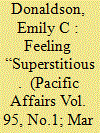

|
|
|
|
|
| Summary/Abstract |
For many Indigenous peoples, ancestral lands are a source of nourishment, strength, and sovereignty that counteracts colonial legacies of violence and hegemony. However, the feelings associated with place and the land can also be complicated by embodied fear and ambivalence. What happens when the remnants of colonialism feed feelings of ambivalence, shame, or fear of the land? How do these lasting emotional scars on Indigenous minds and bodies impact Native place making, today? This paper problematizes the role of ancestral lands and affective place making in shaping Indigenous identity, sovereignty, resource management, and sustainability. In the Marquesas Islands of French Polynesia, ancestral places are felt as much as seen, and the spirits that dwell there can be dangerous. The active concealment of these Marquesan reactions and relationships to place illustrates the blending of colonial and Indigenous histories and values in ambivalent, affective experiences on the land. Thus, even as islanders work to revitalize their traditional culture and build a sustainable future based on ancestral places, reticence complicates local relationships to the land and the vital hopes they represent. As global sustainability efforts emphasize the conservation of lands inhabited by Indigenous communities, recognizing the conflicted, emplaced emotions and experiences of local peoples will be a key part of understanding such areas and how to preserve them.
|
|
|
|
|
|
|
|
|
|
|
|
|
|
|
|
| 10 |
ID:
140429


|
|
|
|
|
| Summary/Abstract |
Although survey data identify no significant predictor of intolerance among the Russian population, young people are considered to display heightened levels of ethnic intolerance and radical variants of xenophobia. Drawing on survey and semi-structured interview data from a study of patriotism among young people in two cities in the North-West region of Russia, this article explores the strength of ethnic self-identification and ethnically exclusive notions of Russianness and compares levels and forms of ethnic intolerance. Identifying that routine expression of xenophobic sentiments coexists alongside a commitment to principles of ethnic equality, the article considers what the ambiguities and contradictions in the articulation of intolerance tell us about how young people negotiate complex contemporary multicultural societies.
|
|
|
|
|
|
|
|
|
|
|
|
|
|
|
|
| 11 |
ID:
119170
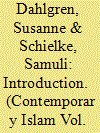

|
|
|
| 12 |
ID:
174505
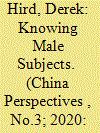

|
|
|
|
|
| Summary/Abstract |
This article probes the sources, manifestations, and significances of the ambivalences and contradictions in London-based Chinese middle-class male professionals’ sense of their own gendered and cultural identities in the context of China’s twenty-first century postsocialist modernity. In doing so, it shows how Chinese middle-class men’s sense of themselves connects with wider national debates about China’s orientation in the world. To make sense of the desire of some respondents “to become a Chinese gentleman,” the article introduces the notion of the postsocialist Confucian sublime, a vision of a cultural order of increasing appeal to well-educated, middle-class Chinese men. The article argues that the Confucian sublime offers globally mobile professional Chinese men the opportunity to transcend their ambivalence towards Western modernity by providing a sense of wholeness and attainment both at a personal level and in relating to China’s place in contemporary globality.
|
|
|
|
|
|
|
|
|
|
|
|
|
|
|
|
| 13 |
ID:
115724
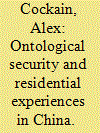

|
|
|
|
|
| Publication |
2012.
|
| Summary/Abstract |
Despite the recent emergence of scholarship on various aspects of contemporary urban Chinese residential life, these accounts typically perpetuate a narrative that situates the anonymous and emotionally distant life in new, often high-rise, apartments in contrast to the hugely more intimate relationships in older, predominantly low-rise living spaces. This article, whilst acknowledging the meaningfulness of such a distinction, first seeks to add ethnographic richness to this division, showing how, at least in the case of a small area within Shanghai's Luwan district, an old/new neighbourhood division is incapable of expressing the more complex, often ambivalent, ways in which people experience residential life, before proceeding to show how residents' experiences often cross-cut what is, in large part, a discursive division rather than a physical demarcation of separate spaces. The article also explores the ways in which residents seek to cope with, as well as find security and comfort within, residential spaces that are changing. Permeating this article are various meanings associated with the term 'ontological security' that, broadly speaking, refers to the order and regularity, as well as sense of well-being, that people feel in their lives.
|
|
|
|
|
|
|
|
|
|
|
|
|
|
|
|
| 14 |
ID:
189473
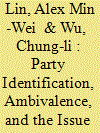

|
|
|
|
|
| Summary/Abstract |
After the Covid-19 pandemic began to wreak havoc around the world in January 2020, Taiwan managed to stay mostly Covid-free due to swift and efficient action taken by the government to contain the outbreak. However, after the country experienced its first significant wave of domestically transmitted cases in May 2021, vaccines became a highly salient issue because Taiwan did not have enough doses to immunize all its citizens. In this study, we investigate how Taiwanese appraise the government’s overall efforts to acquire vaccines. We hypothesize that, apart from a partisan divergence of opinions, some citizens would hold ambivalent attitudes toward the way the government handled the vaccine procurement process. Results from multivariate regression analysis indicate that the effect of party identification on evaluations of government is conditionally dependent on citizens’ level of ambivalence. Specifically, increased ambivalence offsets the strong effect of party affiliation on government evaluation, especially for political independents and supporters of opposition parties.
|
|
|
|
|
|
|
|
|
|
|
|
|
|
|
|
| 15 |
ID:
179318
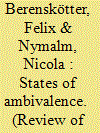

|
|
|
|
|
| Summary/Abstract |
This article revisits and revives the concept of ‘the Stranger’ in theorising international relations by discussing how this figure appears and what role it plays in the politics of (collective) identity. It shows that this concept is central to poststructuralist logic discussing the political production of discourses of danger and to scholarship on ontological security but remains subdued in their analytical narratives. Making the concept of the Stranger explicit is important, we argue, because it directs attention to ambivalence as a source of anxiety and grasps the unsettling experiences that political strategies of conquest or conversion, including practices of securitisation, respond to. Against this backdrop, the article provides a nuanced reading of the Stanger as a form of otherness that captures ambiguity as a threat to modern conceptions of identity, and outlines three scenarios of how it may be encountered in interstate relations: the phenomenon of ‘rising powers’ from the perspective of the hegemon, the dissolution of enmity (overcoming an antagonistic relationship), and the dissolution of friendship (close allies drifting apart). Aware that recovering the concept is not simply an academic exercise but may feed into how the term is used in political discourse and how practitioners deal with ‘strange encounters’, we conclude by pointing to alternative readings of the Stranger/strangeness and the value of doing so.
|
|
|
|
|
|
|
|
|
|
|
|
|
|
|
|
|
|
|
|
|